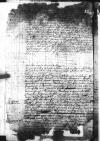Letter #3871
[Ioannes DANTISCUS] to [Tiedemann GIESE]Heilsberg (Lidzbark Warmiński), 1539-07-31
English register:
Dantiscus is sending the messenger of the Gdańsk (Danzig) Town Council to Giese with a letter [from the Council addressed to Dantiscus and Giese], even though they tried to burden him with the package. He thinks the demands made by the Council are legitimate. He asks the addressee to satisfy them and to reply more extensively than he himself has.
He asks Giese to write to the King [Sigismund I Jagiellon] on the matter [of the Gdańsk Town Council] on their joint behalf. Dantiscus will sign and seal the letter, while the Council will cover the cost of its delivery to the court if Giese sends them a copy.
As for [Eberhard] Rogge who has just arrived from Giese, Dantiscus will send him back soon, after they discuss confidential matters in detail.
Manuscript sources:
Prints:
| ||||||
Text & apparatus & commentaryPlain textText & commentaryText & apparatus
Reverendissime in Christo Pater et Domine, frater et paper damaged⌈[t]t paper damaged⌉ amice paper damaged⌈[amice]amice paper damaged⌉ ca paper damaged⌈[ca]ca paper damaged⌉rissime ac honorande.
Salutem paper damaged⌈[em]em paper damaged⌉ et paper damaged⌈[et]et paper damaged⌉ fraternam commendationem.
cf.
Heri a genti<li>bus nostris[1] cf.
Ea, quae in hac hostilitatis denuntiatione petunt[6], iusta sunt atque
Haec, quae in iis, quemadmodum petunt, ad
Quam diutissime incolumem etc.
Datum
Postscript:
Hac hora venit ad me dominus

 AAWO, AB, D. 7, f. 95v
AAWO, AB, D. 7, f. 95v